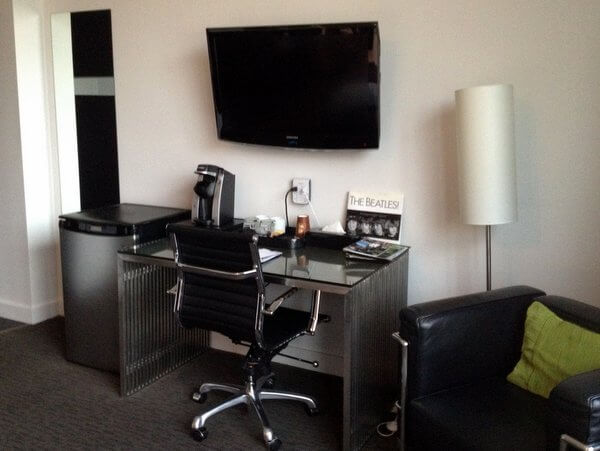
The bright lights of the Dotonbori district, Osaka, Japan
Osaka’s Dotonbori district, the city’s dining and nightlife hub along the Dotonbori River, buzzes with activity. Tourists snap photos of its billboards and flashing neon signs, while much larger-than-life-sized replicas of octopi, nigiri, and other foods, entice visitors into the businesses offering those dishes. It’s a fun place to soak in the ambiance of Osaka, a city of more than 2.7 million, but it isn’t quiet. So when I checked into my hotel — the Cross Hotel Osaka — a short stroll from all the action, I was worried about noise, either from the street or from people coming and going at all hours.
Cross Hotel Osaka
Fortunately, despite the vibrancy — dare I say, commotion — of the nearby streets, the interior of the Cross Hotel Osaka is quiet and calm, in the public spaces and in the guest rooms.
There’s a seating area on one side of the lobby with the reception desk at the center. The front desk staff were welcoming and spoke both Japanese and English.
Occupying floors 6 through 14, the hotel’s guest rooms vary in size and bed configuration. My twin room, accented with red upholstery, had two side-by-side beds with thick duvets and a sofa under the window with a small table that could move to accommodate a laptop or a drink.
The room was set up well for working, with a desk opposite the beds, plenty of electrical outlets, and well-functioning Wi-Fi. A cabinet held an electric kettle, with packets of instant coffee, as well as black and green teas.
A hotel guide on the TV explained various services and amenities, from restaurant hours to Wi-Fi access.

Bathroom with a soaker tub and shower
The bathroom was divided into two spaces, one with the toilet and sink, and a second with a shower and deep soaker tub. Although I was here alone, it would have been a useful setup for two travelers allowing one to bathe or shower in private, while the other used the other facilities.

Selections from the breakfast buffet at the Cross Hotel Osaka
I loved the daily breakfast buffet (included in many room rates), with both Japanese and other dishes. A chef made okonomiyaki some days, Osaka’s signature omelet-like pancake, served in petite individual portions. There were several types of seafood, all sorts of pickles, soup, and rice, as well as pastries, fruits, eggs, and breakfast meats.
Guests can help themselves to juices, to green or black teas, and to coffee, espresso, cappuccino, and other caffeinated beverages from the self-serve coffee machine.

teamLab Botanical Garden, Osaka, Japan
What’s Nearby?
Besides the Dotonbori bars and restaurants, it’s a short walk from the Cross Hotel Osaka to Kuromon Ichiba, a covered market lined with food stalls. Both the Shinsaibashi and Namba metro stations are within a few blocks of the hotel, where you can catch the subway to almost anywhere in the city, including Shin-Ōsaka Station, where the Shinkansen, the bullet train that whizzes you to Tokyo in less than two and a half hours, arrives and departs.
My favorite Osaka experience was an evening walk through teamLab Botanical Garden, a fascinating light and sound installation — like a glowing outdoor art gallery — in the city’s Nagai Botanical Garden.
Whether you’re traveling for business or simply exploring Osaka, the Cross Hotel Osaka is a solid choice. It may not have the personality of a traditional Japanese-style hotel, but it’s modern and quiet. Even with the lively streets of Dotonbori just outside the door.
Rates
Double room rates at the Cross Hotel Osaka start at about $150 per night. Check their website for packages including breakfast or for advance purchase discounts. You can also compare prices at agoda.com (a great booking site for properties throughout Asia) or Booking.com.
Hotel feature by Vancouver-based travel, food, and feature writer Carolyn B. Heller. Photos © Carolyn B. Heller. I traveled to Japan with support from JTB Corp. Hokkaido Branch, but I paid for my own stay in Osaka.




